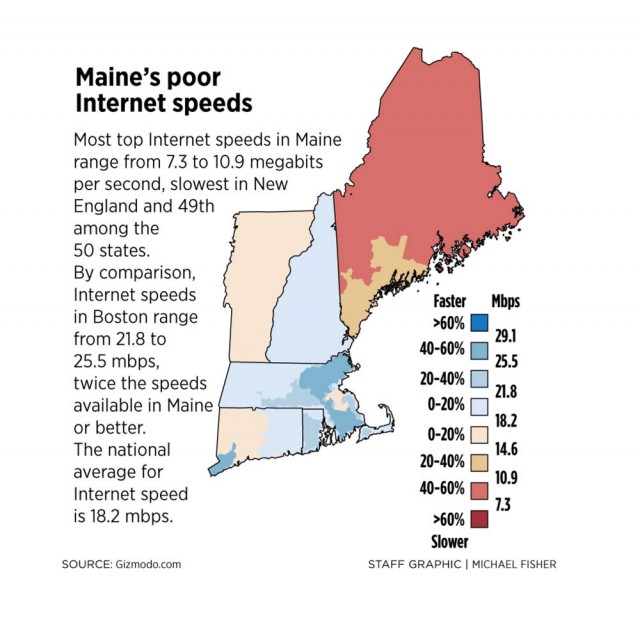
Maine’s broadband speeds are among the worst in the country. (Graphic: Portland Press Herald)
If talking about broadband was the same as getting broadband, Maine would be saturated with High Speed Internet service. Despite years of blue ribbon task forces, studies, grants, and lawsuits, the state of broadband in Maine has never been worse, ranked 49th among 50 states for quality of service and availability. The only state below Maine is Montana.
Maine’s woeful broadband is the result of passive providers including Time Warner Cable and FairPoint Communications that find little incentive to expand service into Maine’s considerable rural back country. Even if they did offer service, Maine’s aging population hasn’t shown much enthusiasm for spending hours online, assuming they understood how to navigate the Internet in the first place.
So how do you convince Maine’s broadband providers to deliver more and better service? Throw money at them in the form of tax breaks and subsidies, suggests David Maxwell, program director of the ConnectME Authority. He believes that if providers are incentivized to wire the unwired by agreeing to cover some of the costs, they will do it.
But as the Portland Press Herald reports, eight rounds of ConnectME grant funding to providers that averaged $1 million each has not made much of an improvement in the state’s broadband standing.
Maine residents in cities and large towns can usually find broadband service from either Time Warner Cable or FairPoint Communications, which purchased the deteriorating copper wire network abandoned by Verizon Communications as it exited the landline business in northern New England. Cable broadband customers can buy speeds up to 50Mbps, but Time Warner’s presence in Maine is not widespread. The majority of customers still buy access from FairPoint, and DSL speeds in Maine are slow.
Gizmodo reports the majority of Maine counties serviced by FairPoint currently receive a maximum speed of 7.3-10.9Mbps, primarily over DSL. That is 40-60 percent slower than the national average. In nearby Boston, speeds average 21.8-25.5Mbps.
FairPoint has been reticent about upgrading its landline infrastructure, particularly in rural counties. Maxwell told the newspaper FairPoint and other providers can’t justify an investment in broadband with no possibility of a quick return. But the phone company has also been accused of reneging on commitments already made to improve Internet access.
The Maine Public Advocate’s Office sued FairPoint to speed up and broaden its efforts to expand broadband to at least 87 percent of customers no later than April.
Wayne Jortner, senior counsel, told the Portland newspaper FairPoint vigorously defended against the lawsuit, but ultimately lost.
“In fact, the litigation did cause us to go all the way to the Maine Supreme Court, and we won there again,” Jortner said. “Now they’re on track to pretty much do what they said they would do.”


 Subscribe
Subscribe
By the way in Boston now have RCN running 110mbps …